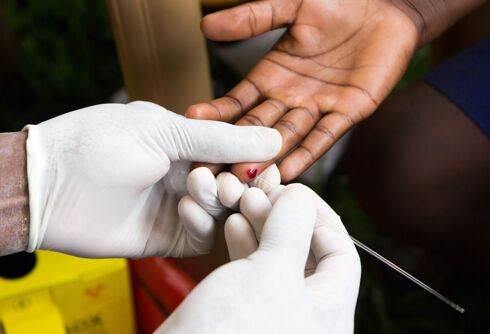SPOILER ALERT FOR EPISODE 3
Ahead of its series premiere earlier this month, critics were calling the third episode of HBO’s The Last of Us a high point in an already excellent show.
The episode, “Long Long Time,” which premiered last night, finds smuggler Joel (Pedro Pascal) and scrappy teen Ellie (Bella Ramsey) journeying through the post-mushroom-apocalypse Northeast after the tragic death of Joel’s partner Tess (Anna Torv). But Joel and Ellie take a back seat this week, with much of the episode devoted to a gay couple, Bill and Frank, played by openly straight actor Nick Offerman and Murray Bartlett.
The episode, which clocks in at an unusually long 75 minutes, takes its time getting to Bartlett and Offerman’s characters. We spend the first 15 minutes with Ellie and Joel, before flashing back to just after the cordyceps outbreak that destroyed civilization as we know it. Bill (Offerman) escapes being carted off by soldiers to be exterminated with a bunch of other poor uninfected souls by being a crazy resourceful survivalist type hiding in his basement, who then goes all over town ransacking Home Depot, the power plant, etc. for everything he needs to basically create a fortress around his whole deserted town and be a self-sustaining, off-the-grid loner. (Christ, I don’t even have a go-bag…)
Never Miss a Beat
Subscribe to our newsletter to stay ahead of the latest LGBTQ+ political news and insights.

But it’s not long before Frank (Bartlett) comes along and falls into one of the traps Bill has set—luckily, it’s just a big hole and not a trip wire that shoots him. After some initial hard-ass survivalist mistrust, Bill brings Frank home and lets him take a hot shower and makes him what looks like a truly excellently plated meal, complete with, LOL, literally the exact same Beaujolais I always buy! (Is Beaujolais gay? Discuss…)
Frank discovers Bill’s book of Linda Ronstadt sheet music, and Bill plays “Long, Long Time” on the piano, letting his guard down enough for Frank to kiss him. At some point I’m going to have a real long think about why Linda Ronstadt is the perfect not-too-gay but also totally obviously gay music for a closeted doomsday prepper to be into.
When the two of them go to bed together, we learn that this is Bill’s first time with another man. And look, maybe I’ve seen one too many grim nihilistic zombie shows, or just generally have an innate distrust of humanity, but if I didn’t already know what this episode was all about, I would literally be terrified for Frank in this moment. Like, in real life, if you go to bed with a closeted doomsday prepper guy, there is a not insignificant chance that afterward he gets hit by a shame tsunami and beats you to death, right?
Cut to: Their first fight! Which is not, as it initially seems, Bill running Frank off the next morning, but in fact occurs some time later when Frank wants to clean up the neighborhood. Bill thinks this is a waste of resources, but Frank explains that actually, he’s not just being all gayly obsessed with aesthetics. He wants them to make a home and a life together and show love for themselves and hope for the future by not just surviving but caring for the world around them. Which might be the thesis of this show?
Frank also wants them to have friends. It turns out, he’s been talking to Tess on the CB radio, and then we cut to Joel and Tess having a lovely lunch in the garden with our boys. So, that’s how Joel knows Bill and Frank.
Three years later, they’re still thriving. They have lovely joyful moment over some strawberries that Frank has grown, and Bill suddenly realizes that he was never afraid before Frank showed up, i.e. because part of loving someone, loving anything, is fearing that you will lose them.
Later, a whole bunch of raiders show up in the middle of the night, just like Joel said they would. Luckily, Bill’s booby traps take care of them, but he gets shot and, thinking he’s dying he tells Frank to call Joel because he’ll take care of him when Bill is gone.

Cut to: 10 years later. Bill is not dead (phew!), but they’re both very old now, and Frank is in a wheelchair having had a stroke or something. This whole section of the episode has an elegiac quality; they’re reaching the end of a life together that has saved both of them from despair. While everyone in the Quarantine Zone has been eking out a miserable existence under martial law, Frank and Bill have lived and loved, with all the joy and pain that brings.
So now for the pain: Frank wakes up one morning and realizes it’s his last day. He’s dying, and he has the whole day planned out: he and Bill are going to get married in their home, surrounded by all the paintings he’s done over the years, and then he’s going to take all his pills and die quietly in his husband’s arms.
But instead of giving Frank all of the pills, Bill takes a bunch of them as well. “This isn’t the tragic suicide at the end of the play,” he says, acknowledging, if not entirely upending, the tragic “bury your gays” trope employed so often in media. “I’m old, I’m satisfied, and you were my purpose,” he tells Frank. And so, they go to bed together one last time.
Final thoughts: Bill and Frank’s story could have been anyone’s. There was a time, not so long ago (anyone remember NBC’s Rise?), when some network exec might have said, “Couldn’t we just make these gays a straight couple and achieve the same thing?” But The Last of Us didn’t do that. Instead, the series conveyed its hopeful, humanist message via an elder gay couple. It showed that there is a place for us in the future, whatever that future looks like; that, as has been borne out in our actual history, we have as much grit and ingenuity to survive a catastrophe—a plague—as anyone else. That we are survivors, and more than that, we can carry the torch for humanity and community in the face of grim despair through our simple insistence on our right to love each other.
Re: “bury your gays,” though… As lovely as this episode is, it does still employ that unfortunate trope. The bulk of the episode is devoted to Bill and Frank and the story of their love. But while they don’t die young or violently, and they go out nominally on their own terms, they still die, and their deaths serve to further the narrative and character development of at least one straight character: Joel. He and Ellie arrive sometime later and find a note from Bill. Joel grieves and probably realizes something about the importance of staying connected to people, of committing oneself to caring for others, that will propel him forward in his journey to get Ellie to safety. They take what they need from the house (a less charitable read might call that a metaphor) and drive off in Bill’s truck listening to Linda Ronstadt.
Don't forget to share:















